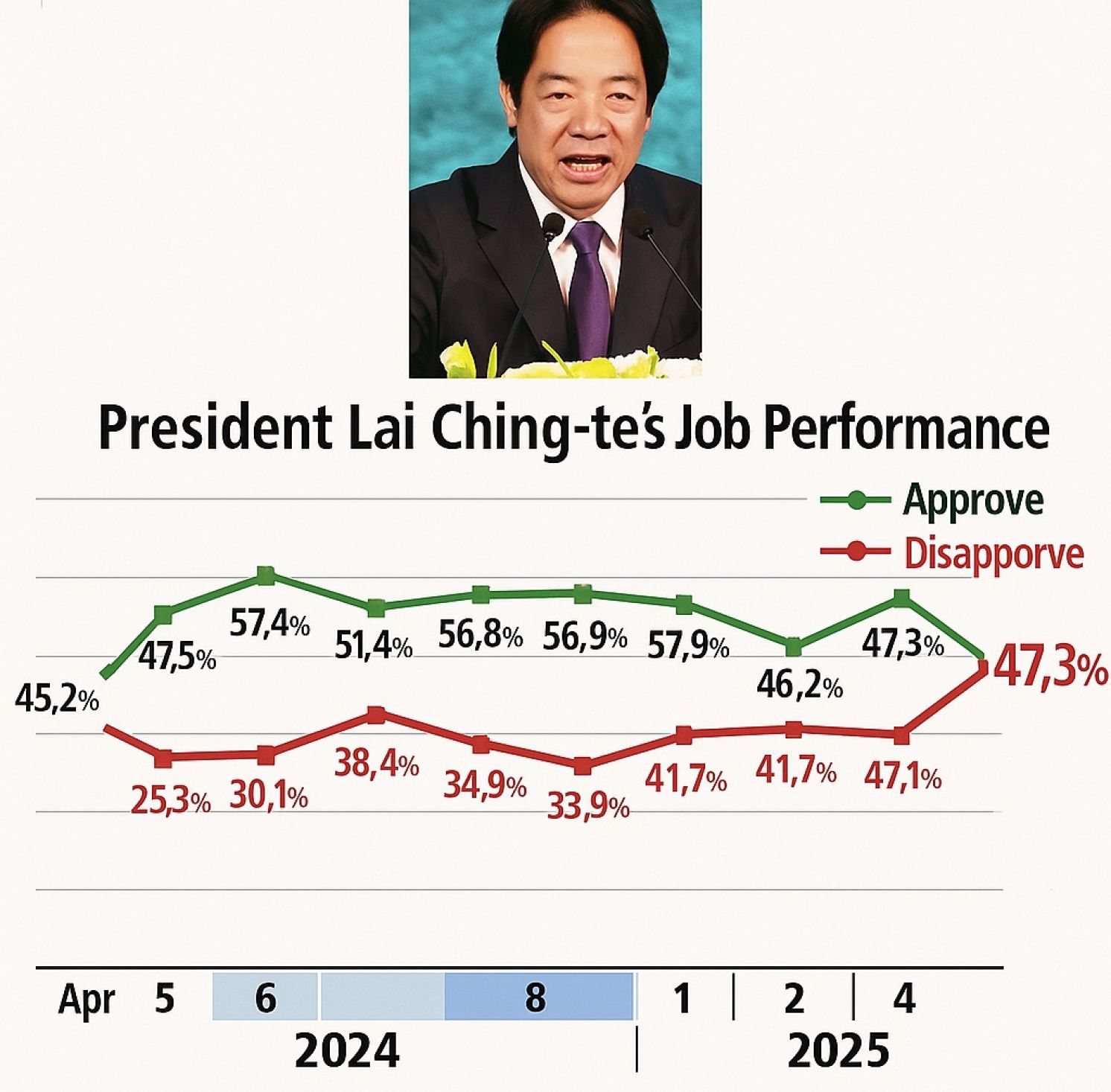
President Lai All-Out on Eliminating Opposition, Triggering Public Backlash
China Times, Featured Editorial, April 30, 2025
The Kuomintang’s (KMT) massive “Fight Against Dictatorship” rally on April 26 drew significant momentum, but President Lai Ching-te mocked it by saying protesters “should go to Tiananmen Square.”
It turns out he had already issued strict orders demanding all 35 recall motions against KMT legislators be passed. At a time when U.S.-China trade tensions are escalating, and U.S. President Donald Trump’s new tariffs threaten to devastate Taiwan’s exports, the Lai administration has shown no interest in an economic response.
Instead, it is fully consumed with suppressing the opposition—unsurprisingly drawing public resentment.
Approaching his first anniversary in office, President Lai’s approval rating has dropped by 8.5 percent, with his first “death cross” appearing in the latest Formosa e-paper poll.
The survey also highlights widespread dissatisfaction with political interference in media and judiciary: 70 percent believe the government is manipulating the media, 60 percent think top officials abuse power, and 57 percent say political influence has infiltrated prosecutorial investigations.
President Lai once aspired to be a competent leader and cited the late Pope Francis’s words: “A good shepherd should smell like the sheep.” But now, in his quest to overturn the legislative majority and consolidate power, he has become a wolf in sheep’s clothing—showing his fangs, silencing dissent and openly meddling in the judiciary.
Take the special investigation units under local prosecutors as an example: instead of cracking down on major black-gold (political corruption) cases, they prioritize investigating alleged forged signatures in KMT petitions.
Capable officials of the Investigation Bureau, Ministry of Justice, rather than focusing on drug crimes, fraud, or major economic offenses, are now dispatched to raid and interrogate opposition party staffers. This is a gross misallocation of resources.
Even Minister of Justice Cheng Ming-chien admitted the Taipei District Prosecutors Office is “too busy with politics”—a blatant sign of political interference in the judiciary.
This top-down recall campaign, orchestrated by the DPP leadership, lacks democratic legitimacy. It is the first of its kind in any democratic nation and is nothing short of a “malicious mass recall,” tearing Taiwanese society apart.
To the ruling party, the opposition KMT and Taiwan People’s Party (TPP) are labeled as traitors or “fellow Chinese Communist sympathizers.” DPP legislative leader Ker Chien-ming even accused them of selling out Taiwan to China. Ironically, recent espionage cases have primarily involved individuals within the DPP’s circles, yet the party insists, absurdly, that “the more you oppose Communist China, the more you’re infiltrated.”
While the recall fires rage on, the Trump tariff storm is about to hit. Traditional industries like machinery, plastics, and auto parts will be the first to suffer, potentially leading to over 100,000 job losses. The Premier Cho cabinet responded with a bloated special budget—of NT$410 billion (about US$13.3 billion); less than a quarter is allocated to industrial upgrading. Most of it is funneled toward arms purchases and covering Taipower’s losses, leaving the looming industrial crisis unaddressed.
This budget reflects the Lai administration’s lack of a coherent governance blueprint. Despite tectonic shifts in the global semiconductor supply chain, it has presented no viable strategies for industrial upgrading, youth employment, or digital transformation—only slogans and cash handouts.
The most controversial move is using the special budget to cover Taipower’s losses, a clear act of fiscal evasion. Such actions undermine financial discipline and erode public trust in the budgeting process. Instead of taking responsibility, Premier Cho scapegoats the opposition for electricity rate hikes while manipulating the media to distract from his administration’s incompetence.
At this critical moment, as Taiwan faces daunting international challenges, President Lai must serve as an integrator, a balancer, and a navigator.
He should take the initiative to resolve the political gridlock rather than act like a shadow figure manipulating the malicious recalls from behind the scenes. He must not disregard the inflated budgets used to whitewash his administration’s performance, nor should he tolerate political interference in journalism, where cabinet ministers have become chief purveyors of misinformation.
Polls don’t lie. Neither do the voices on the street. According to the latest Global Views Monthly poll, President Lai now trails behind mayors Lu Shiow-yen and Chiang Wan-an in public favorability.
The strategy of mindlessly opposing China is a dead-end, the roar of 250,000 protestors on Ketagalan Boulevard is a wake-up call. Political witch hunts must end, and the judiciary must never be weaponized for political struggle.
As the Trump tariff storm looms and global economic uncertainty grows, Taiwan needs a policy focused on people’s livelihoods. At this critical juncture, President Lai must rise above the fray—as an arbiter of political conflict and a navigator of national policy.
From: https://www.chinatimes.com/opinion/20250430005120-262101?chdtv
〈Back to Taiwan Weekly Newsletter〉